By acknowledging and openly discussing the concerns of disgruntled customers on social media, businesses may actually boost their reputations -- and their bottom line.
The company I work for, a daily deals website called 1SaleADay.com, recently sold a credit card pocketknife, a utility knife that folds into the size of a credit card. Soon after, a customer in law enforcement posted the following message, criticizing the sale of this product:
As a Law Enforcement Officer, I do not appreciate you selling items that criminals can easily hide... As a result of you selling this product, I will no longer be your customer, and will be spreading the word, via word of mouth and social media, for people to stop buying from your website.

The majority of 1SaleADay's customer service inquiries consist of routine questions on shipping and returns, not questions on the ethics of selling certain types of products. Our initial internal reaction was to transition into damage control: Apologize to the customer, reconsider listing the product and encourage the customer to resolve the issue outside the public eye and social media.
Then we thought again. Media Consultant BIA/Kelsey estimates that small businesses spent $1.6 billion managing their online reputations in 2011, and are projected to spend more than $5 billion a year by 2015. Instead of incurring that cost and living in constant fear that negative customer feedback through social media will harm our reputation and goodwill, why not use negative feedback as an opportunity to create customer dialogue through those same social channels?
From a financial perspective it was important for us to survey our consumers to ascertain whether this particular consumer's sentiment was more widespread. We decided that if the reaction to selling the knife was overwhelmingly negative, we would reconsider whether to sell this product because it would hurt our bottom line by alienating existing customers. On the other hand, there was also a concern that by soliciting feedback we would draw unnecessary attention to this issue and bring out otherwise latent criticism.
After careful contemplation, taking into consideration the valuable feedback received from customers in the past on issues ranging from product selection to customer service, we decided to open up the discussion to our 420,000 active Facebook fans, trusting that customers would value the transparency and opportunity to be heard.
In a Facebook post, we asked our followers what they thought about us selling the credit card knife. We asked this question the day that we listed the credit card pocketknife so we were able to gauge the direct impact on sales. We relayed the officer's feedback (without any personal or identifying information), and within 24 hours we received over 750 comments on our Facebook post.
Many of those that left comments were appreciative that the company was seeking their perspective. The vast majority agreed with the decision to list the knife, pointing out that other major retailers sell the same and similar knives. One comment, which received over 230 independent likes, declared,

The few customers who believed we should not sell this product were still respectful, and the discussion around the product was positive and energetic. Several other members of law enforcement even weighed in. One notable comment with 53 independent likes, read:

The post garnered over 750 comments, the vast majority supportive of the product. Facebook analytics indicates our post was viewed 117,806 times, so many of these views were reading positive comments that helped reinforce brand loyalty. The discussion and traction that the posting created, led to at least 185 direct conversions and several hundred new likes to our Facebook page. That certainly translated into a positive financial impact.
Why cut customers out of the process of whether to re-list this product? Why not create an open dialogue wherein customers' opinions are considered, rather than the opinions of executive arm-chair experts? Customer feedback is unavoidable. Companies should look to embrace it instead of suppressing it. After all, it is the customer's perspective that matters most.
1SaleADay.com's approach of embracing customer feedback was reported by ABC News in a story that contrasted 1SaleADay's approach of embracing negative feedback with an eBay seller that sued a customer for posting a negative review